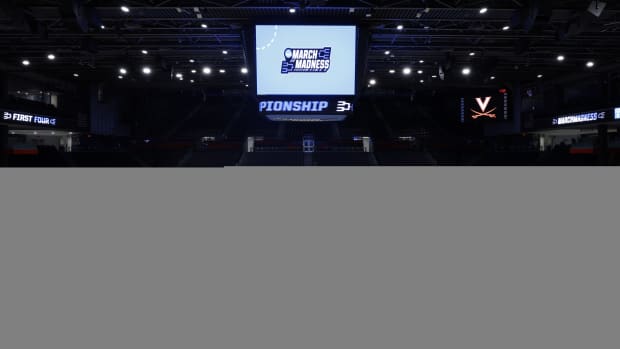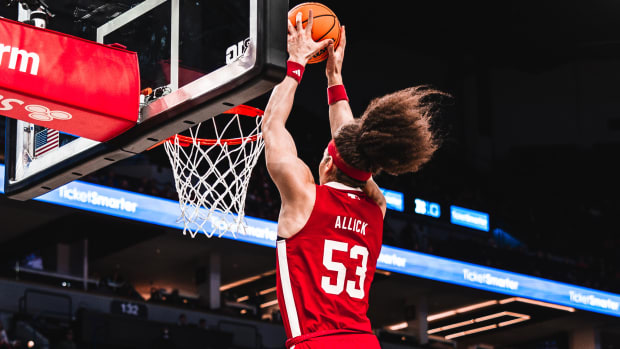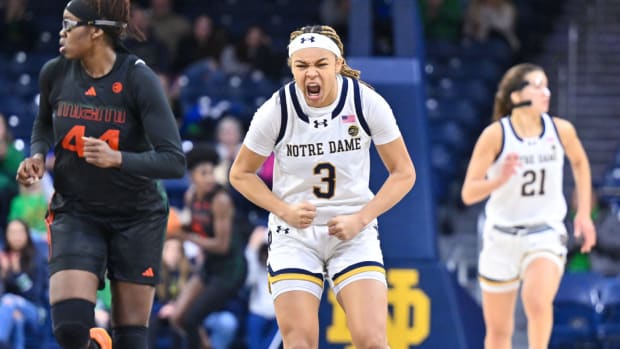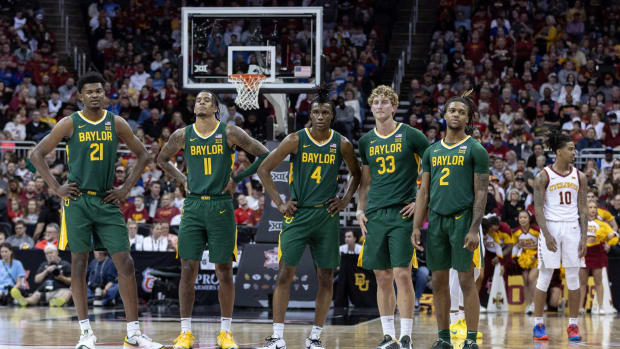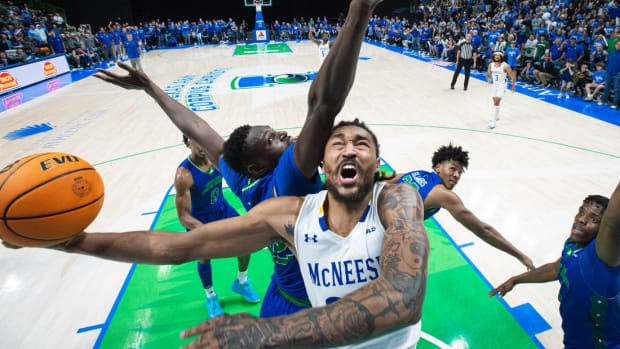A championship is never inevitable. The South Carolina Gamecocks knew this—careful always to emphasize the work they had in front of them, to give credit to all of their opponents, to stay both focused and humble.
But if this championship could not quite be called inevitable, it felt inescapable.
The No. 1 team in the polls from wire to wire—October to March—sealed the deal in appropriate fashion. It never trailed against No. 2 seed UConn in the final on Sunday. For much of the night, the Gamecocks showed off exactly what has made them so tough all year, with relentless pressure and overwhelming power in the paint. A series of competitive Huskies runs could not cut the lead any smaller than six in the second half. This South Carolina team was simply too dominant, too long, too good. The 64–49 final score felt like just one more piece of evidence in support of a truth that has been obvious all season: This is the best team in the nation.
That involved yet another double double—11 points and 16 rebounds—for National Player of the Year Aliyah Boston, in the kind of statement performance she has made look routine all year. It involved a career night with 26 points for senior guard Destanni Henderson. And it resulted in redemption for the whole team after a crushing loss in last season’s Final Four. But there was no question for coach Dawn Staley, who now has two championships in the last six seasons, about what this year’s win meant to her after last year’s loss: This was the title she was supposed to win with this group of players.
Surrounded by her team, confetti falling all around with the trophy, Staley turned to a cheering crowd and let them know: “Our path was ordered to be national champions on this day.”
And then she used her platform on the stage to give credit to her players. Not to Boston, who was about to receive yet another trophy in a postseason full of them, or Henderson or Zia Cooke, her talented guards who were about to be honored on the all-tournament team. No, proud as she was of those three, Staley said, it was all the others she wanted to congratulate. And one by one, she read off the names of her bench players, making sure they got the recognition she felt they deserved: They had been every bit as vital to this process as any of the names the people at home already knew.
It was the natural conclusion to a process she had been running all year.
This, she reflected, was part of what made this championship different for her from her first one: “I learned that culture matters,” Staley said. “I learned that chemistry matters.”
Last fall, Johnny Allen sat in Staley’s office. He and his wife, Felicia Hall Allen, run a leadership development organization that works throughout the season with the Gamecocks, with sessions designed to help players improve their communication skills and define their goals. The couple have known the coach for decades—Felicia was an executive for the Charlotte Sting when Staley was the WNBA team’s star point guard in the early 2000s—and they have watched her transform the program into a powerhouse.
But this year, looking at the roster, Allen remarked to Staley that it would surely provide one of her most difficult coaching jobs yet. With a group this loaded, top to bottom, managing playing time and related conflicts would have to be something of a struggle. He was entirely serious. But Staley just laughed.
“No, Johnny,” he remembers her saying. “It’s coaching when you don’t have this kind of talent that’s a real battle.”
It was a fair point. But it was also a testament to the coach’s skill—to manage a group where every player feels valued, no matter her role on the floor, and to create a culture where everyone is motivated to buy in. Staley has been doing that at South Carolina since arriving on campus in 2008. Yet it was especially pronounced this year. With the need to navigate so much talent on the roster—perhaps the only downside of having the top recruiting class in the nation for two of the last three seasons—Staley had to put considerable work into making sure every player on the team not only knew her specific job but also knew why it mattered.

“I deal with young people’s goals and dreams,” says Staley. “I don’t take that lightly."
David E. Klutho/Sports Illustrated
“You've got to tell them the roles very early on, and then you have to remind them that this is what it is,” Staley says. “We’ve asked all of our players, every single player, we’ve asked to make a sacrifice to make this year special. Sometimes that's playing a whole lot. Sometimes it’s playing a little. Sometimes it’s not playing at all. On any given day, we’re in a position where we have some players that are just situational. Like this is your situation; you just have to make sure that you’re ready for when your number is called.”
It’s a set-up that can easily lead to squabbles or frustration. In Staley’s hands, though, even the most specific of situational players felt supported.
“Deep down, we know we’re all important,” says graduate guard LeLe Grissett, the most veteran member of the team, who has embraced her spot as a role player. “Like, we all have a special place. From the outside looking in, people might not see it; they’ll just see who puts up the points, but we know that we all need each other. We know that this is a special group. Everybody counts.”
That shone through in the team’s depth: Yes, this starting lineup proved deserving of every bit of attention it received, but the roster is more than the five of them. Ask starter Destanni Henderson what people overlooked about the Gamecocks this season, and she goes straight to the bench: “Everybody on the team could be dominant,” she says. “I feel like our depth is very interesting.” Indeed, the ability of bench players to make big contributions when called upon was on display throughout the tournament. It was freshman Bree Hall hitting a major three to gain separation against North Carolina in the Sweet 16, or Kamilla Cardoso using her size to control the paint against Creighton in the Elite Eight, or Saniya Rivers being called to play beyond her usual minutes against Louisville in the Final Four. And that came in part from the clear expectations of Staley: They all felt they knew their specific roles, and as soon as they were asked to execute, they were ready.
As for how Staley made sure players knew what that looked like? Simple: She just told them. To be anything less than completely honest with her players, in her eyes, would be to fail them. “I deal with young people’s goals and dreams,” she says. “I don’t take that lightly, so I just tell them how it is.” That means going straight to the point: Here’s what you have to do for us, here’s why it’s important, and here’s how to make it work.
“You hear what you’ve got to do, you hear your role, and that’s pretty much it,” Grissett says.
It’s as true for the Gamecocks’ bench as it is for their biggest star. When Boston was asked to identify the turning point in her own transcendent, award-winning season, she didn’t hesitate: It was back in November, after a statement win against Buffalo, when her coach told her that she wasn’t doing her job.
Boston had scored 23. But she had only (“only”) seven rebounds. She was a presence in the paint, but she wasn’t a force, and the team needed more from her.
“Coach Staley was like, ‘You’re not being dominant. This is not the Aliyah Boston that we’re expecting,’” Boston recalled of that night in November. “It just flipped a switch. I’m glad she said something, because it got me upset—I was like, ‘I’m doing fine! I’m playing good!’... But she was able to point it out, and the next game I just came out and I was like, ‘You know what? I’m not going to be denied. I’m going to go crash the boards. I'm going to do what my team needs me to do.’”

UConn had nowhere to go against Boston and the South Carolina D on Sunday.
David E. Klutho/Sports Illustrated
That’s a recurring sentiment up and down the roster: Staley knows when to break a player down and when to lift her up. She connects with them individually, and she understands when to talk and when to listen. “Her perception of having a pulse on where her team is and what they need—I think it has to be a spiritual gift,” Felicia Hall Allen says, remembering that from Staley even as a player on the Sting. “She has the capacity to read her team, but a lot of people can do that. … Not a lot of people have the ability to actually meet the need, to meet them where they are and get them to where they need to be.” It has been one of the coach’s strengths for as long as anyone can remember. She chooses her words carefully, those around her say, because she knows just how much they can matter.
“If Dawn spoke, there was silence in our huddle,” recalls her own college coach, Debbie Ryan, who went to three consecutive Final Fours with Staley as a player at Virginia in the early 1990s. “There was nobody who ever tried to talk over her, because she didn’t say that much, but when she did, it was always the right thing.”
Staley was the quintessential point guard, Ryan says, a masterful communicator who excelled at sharing her court vision and ability to think ahead with her teammates. She just connected. And that applied off the court, too: Ryan remembers all the community service Staley did at UVA, volunteering with kindergarten classes where smitten children would climb into her lap and visiting senior centers where she would talk with elderly people for hours. Staley clicked with everyone. She had gone out of her comfort zone, choosing to leave her childhood neighborhood in North Philadelphia to play in Virginia, but she showed a remarkable ability to form connections no matter where she was.
That has been fundamental to her success as a coach. To play with Staley, and to win with Staley, is to be part of a community she has worked hard to cultivate.
“The way that Dawn’s players come back and they remain a part of the program—it really allows you to see how it's an extended family,” Felicia Hall Allen says. “Dawn brings an approach where she wraps her arms around and then she holds her hand out. And I think that she extends an open invitation for anybody who has something positive to pour into her program to feel like they had a hand in it, that they are part of the team’s success, and that makes her so special. … So many people want all of the credit, but she so willingly shares it with everybody.”
Staley made that clear throughout the tournament. She spoke of how important the fans are, remembering how she would invite them into her office when she first arrived on campus, figuring out how to build the kind of environment that people wanted to participate in. “We give our fans access to us, and in return, they fill our arena,” she explained. She shouted out the local media who had traveled to cover the team throughout the season. Again and again, she reiterated that her view of success was holistic, and she saw the program she had built as much bigger than herself. That was on display in details over the last month. It was in Staley asking all of her assistant coaches to pose alongside her in the spotlight when she accepted her award for Naismith Coach of the Year. It was in her decision to have the Allens hold a session with the players before the first round, recognizing they might need a space to be open and vulnerable without her or her staff in the room. It was in her choice to bring the national championship trophy to the school band shortly after it was placed in her arms. And it was in how her players worked on the floor—bolstered by a full understanding of how much their coach supports them.
“She trusts me. She believes in me,” guard Brea Beal says of Staley. “And I believe in her and I trust her for putting me in a position to succeed and telling me what I’m best at.”

Henderson dropped a career-high 26 on UConn in the title game and at the other end neutralized Bueckers.
David E. Klutho/Sports Illustrated
That, in some ways, is a natural extension of what the coach did as a player—a point guard who set up all of her teammates to be at their best on the court. But some of it has come more recently—an awareness of what it means to be trusted with the responsibility of guiding the careers of these young players.
“She’s just really blossomed into a Hall of Fame coach,” Ryan says. “She sees the best in everybody, and she’s able to enhance what they do and take them to the next level, which they probably never saw in themselves. That’s kind of what she's developed the most over her coaching career—to be able to see things through her players’ eyes and then widen the scope of what that player is seeing. … It’s incredible.”
That is something Staley’s entire roster feels—that she expands their vision and sense of possibility. It’s true on the court (Staley has always had an uncanny ability to see all the potential ramifications of a play, and to spell them out for those in front of her, Ryan notes), but it’s true outside of basketball, too. For many of her players, there is special power in being coached by a Black woman, someone whose mere presence in her role is a sign of progress and whose success is a sign of possibility.
There is perhaps no one on the roster for whom that expansion of vision is clearer than in Boston. Her transformation as a player has been impossible to miss: Always talented, her three years in Columbia have seen her grow more assertive to become the most dominant forward in the country. There is no one like her in the paint. Her rebounding ability is so remarkable that it can almost feel automatic, and she has become a fierce scoring threat, too. That comes from Staley: This is what you are capable of. Do not let yourself settle for less.
“I think a player like Aliyah doesn’t realize her power,” Staley said. “She doesn’t want any conflict. She’s not confrontational. When you are like that, you don't really understand the power of being dominant. … I’ve been around a lot of great basketball players who have been dominant, and I saw it in her, and I would not allow her to be anything less than that.”
Boston has grown in other ways that are just as striking off the floor.
“As a freshman … she was very, very talented and I think her talent was what was out front. And I think that now she’s come into her own, and it’s not just her talent leading the way, but I think it’s everything about her,” says Felicia Hall Allen, noting how much Boston’s participation in their team leadership sessions has grown over the last few years. “Her work ethic, her voice, her willingness to be vocal is out front, and her passion and intensity is out front, and those things are leading the way.”
For all of that, Boston credits Staley. “For Coach Staley, especially having the platform that she has and being my coach, it’s just special to see because it’s like—I mean, I see this woman every day and she’s not afraid to use her voice and be who she is, which just continues to give me a boost,” the junior says. “Because I know that I have a platform and if I think something is wrong or not happening that I should be able to speak up on it.”

Boston, the Final Four's Most Outstanding Player, collects Carolina's hardware.
David E. Klutho/Sports Illustrated
Staley takes seriously what it means as a Black woman to hold the leadership role in the game that she does. And much like she uses that fact to inspire her players, she tries to use it to uplift other Black women in the sport, too: When she won her first title, in 2017, she cut the net into tiny pieces that she sent to every Black female coach in the country. To receive one was “extremely important,” says Arizona coach Adia Barnes, who was in the Final Four last year with Staley. “She’s someone who was able to give all of us tangible goals, where we could see them—like, the net, that’s just something no one else would do.”
Staley also kept some of that yarn for herself. And on Sunday, as she coached for her second title—becoming the first Black coach in Division I basketball history to achieve it—she kept a bit of that first championship net on her. As she sat at her press conference, she pulled it from her pocket, and she mused about what she might do with her second one: Perhaps some for Black male coaches this time, or Black journalists.
She likes to think of the net as a symbol, she said. And for a coach who fought her way here with straightforward communication, with specific expectations and defined roles and clear voices, the yarn is the perfect sign—here is my role, and yours, and here is a way of tying us together.
“What I think is important as a Black woman and coach is the way you do it, like the example that you set for other coaches to follow,” she said. “That is the exact way we’ll grow is just lifting each other up, giving us a platform where we’re encouraging, we are helping each individual be the best that they can be and succeed.”
More March Madness Coverage:
• SI Weekly Podcast: Aliyah Boston’s Dominance
• The Lost History of the Only HBCU to Make Final Four
• UConn’s Turbulent Year Ends Short of Ultimate Goal


